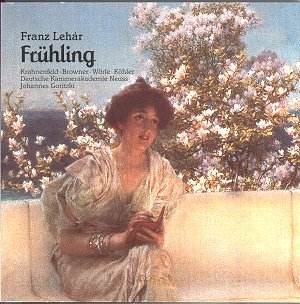
|
Franz LEHÁR (1870-1948) Frühling (Spring) - Operetta in One Act Hedwig, the girl ………….. Stefanie Krahnenfeld (soprano) Toni, the girl friend ……… Alison Browner (soprano) Lorenz, the composer………Robert Wörle (tenor) Ewald, the poet …………….Markus Köhler (baritone) Elfentanz Concert Waltz (1892) Magyar Abránd, Hungarian Fantasy for violin and orchestra (1897) Deutsche Kammerakademie Neuss am Rhein directed by Johannes Goritzki (Co-production: Deutschland Radio/cpo recorded March 2000, Grosse Sendesaal) |
Premiered in Hell? Well, yes, this Lehár operetta with some very naughty lyrics (by Rudolf Eger), and a story that involves young men peeking through a girl’s wardrobe was actually given its performance within a cabaret called Hell on January 22, 1922. Located in the cellar of the Theatre an der Wien , the Hell specialised in little one-act operas.
Frühling is rather different. By 1922, the public was heartily sick of the usual formula operetta stories full of princes, counts and gypsy girls. Instead Frühling is set in a typing pool in a Vienna in the grip of a housing shortage. The heroine, Hedwig, desperate to have accommodation, dreams up an imaginary lover to obtain a room. She advertises for a room-mate to legitimise the pretence making it plain that he and she should never meet. (Arranged so that she should depart for work in the morning as he comes in from his night shift). He, Lorenz, is a (painfully shy) composer and of course his poet friend and librettist, Ewald, goes into the typing agency where Hedwig works to have the libretto of Lorenz’s opera typed. With the involvement of Hedwig’s girl friend, Toni, there follows a farcical plot of romantic misunderstandings. Cupid eventually overcomes Lorenz’s shyness and Hedwig’s rigid rules.
Lehár scored the original one-act production for a small chamber ensemble. When he later expanded the work into the three-act Frühlingsdmädel, he expanded the orchestration too. For this recording we hear the larger ensemble, but the original briefer production.
Lehár’s Frühling music is full of the melodic delight one associates with The Merry Widow etc. The ten numbers of his score range over his whole broad musical spectrum embracing the latest dance rhythms of the one-step, shimmy and fox-trot to sweeping waltzes, preludes, and instrumental interludes. An enchanting music-box melody has a heightened musico-dramatic significance and it is announced early in the Prelude. Unusually, we have one of the romantic highlights as a duet for Lorenz and Ewald as the shy composer confesses he has fallen in love with his unknown roommate in the introductory ‘Ach, ist das nett’ (Oh, that’s nice…) simply by seeing her clothes in her wardrobe. Yet, in the following duet ‘Nur ein Stückchen Batist’ (Only a little piece of batiste [a plain soft-woven fabric made of cotton or linen]) the cheeky pair agree "Oh what sweet coquettish things one indeed does find in women’s wardrobes…But don’t think of sticking your mitts on the inventory!" But it is all harmless fun. Both Robert Wörle and Markus Köhler have the clear lightweight yet ardent voices so suitable for operetta. Hedwig, and especially Toni are street-wise and there is a more down-to-earth tone than usual in the voices of the two sopranos whose singing is colourful and expressive. The highlight of the work comes when Hedwig is inspired, in a face-saving gesture after ejecting her shy lover at curfew time, to turn her clock forward to 8 o’clock signalling Lorenz that it is time to enter the room (and fall into her arms). This is Lehár at his most romantically magical. Three tuneful orchestral dances are included in the Frühling score: Valse de fleurs, Mazurka and Plaisanterie
The programme fillers are two more orchestral items. The Elfentanz, with fairy dust overlaying a typical Viennese waltz has appealing birdcall-figures in the woodwind, and was written by the young bandmaster Lehár in 1892. Magyar Abránd is a virtuoso bravura piece for solo violin and orchestra with some familiar figures. Mark Gothoni gives it the full fiery gypsy treatment.
Frühling is a street-wise operetta of the 1920s - full of hummable tunes and a libretto that is naughty but nice.
Ian Lace